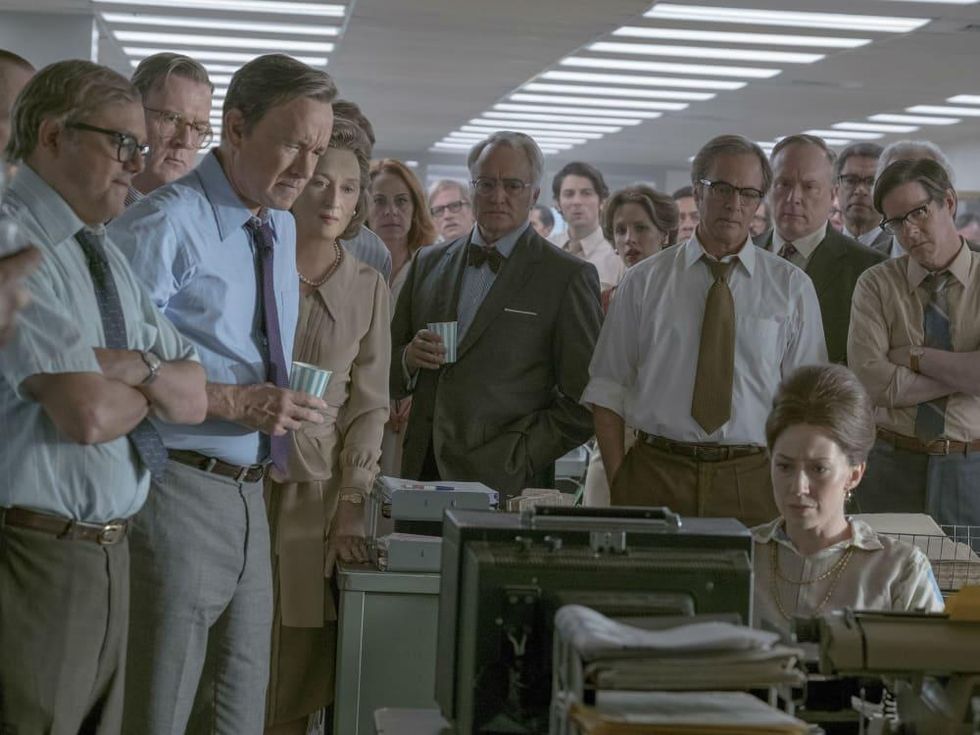Movie Review
Spielberg positions present-day parallels above the fold in The Post
When director Steven Spielberg announced early in 2017 that he would make The Post and turn it around quickly for awards season consideration, it seemed like an obvious rebuke to the new presidential administration. The story, in which The Washington Post fights with the Nixon administration in 1971 for the right to publish what were known as the Pentagon Papers, has clear parallels to President Trump’s disdain for the mainstream media.
But what Spielberg, along with writers Liz Hannah and Josh Singer, may not have anticipated is that another aspect of the story would have equal, if not greater, relevance on the current cultural landscape by the time the film came out.
The film centers on Katharine Graham (Meryl Streep), publisher of the Post at the time, and Ben Bradlee (Tom Hanks), the indefatigable executive editor. As the story begins, Graham is still trying to get a handle on her role as publisher, a title she inherited eight years earlier. Her decision to hire Bradlee has met with only limited success, and the paper is still struggling to establish itself as a major player in Washington, D.C., much less the country.
When The New York Times publishes parts of the Pentagon Papers, a study commissioned by former Secretary of Defense Robert McNamara to look at America’s involvement in Vietnam, the Post is caught flat-footed. When federal courts subsequently prohibit the Times from publishing more of the papers, Bradlee considers it an imperative to find and publish the papers themselves.
This is all set amid the backdrop of Graham deciding to take the Post public on the American Stock Exchange, an action that at once seems to be her decision and also somewhat out of her control. As a rare female executive, she has no shortage of bull-headed men trying to tell her what to do, and her lack of confidence doesn’t help matters.
Spielberg immerses the audience in the down-and-dirty work of journalists, who often have to sift through vast amounts of material in a short period of time. The work appears both exhausting and exhilarating, as, at least on film, every last reporter is willing to do whatever it takes to track down leads and get the story right.
This dogged nature serves the story well, although the film doesn’t necessarily have the propulsive nature of movies like Spotlight or All the President’s Men. That’s not to say that it isn’t fascinating, but the intricate nature of what they’re reporting is nearly impossible to fully understand in this form. Instead, it’s the relationships — between co-workers, between government officials and reporters — that drive the film.
While there’s little evidence of sexual harassment in the film, it’s easy to feel the general disdain or doubt some of the men have for Graham and other women. Graham’s position is viewed as one that was not earned, and on more than one occasion she’s reduced to a shrinking wallflower instead of as the leader of the paper.
But, this being a Meryl Streep character, she doesn’t stay that way forever. Streep has earned 20 Oscar nominations and counting because of her ability to convincingly portray both strength and weakness. While never truly weak, Graham appears to be overmatched for much of the film, and it takes someone of Streep’s excellence to keep her as a compelling character.
Bradlee is a different type of role for Hanks, one which doesn’t allow him to be nearly as affable as usual. It’s a nice change of pace for him, as it lets him show another range while still remaining in control. He’s joined by an embarrassment of supporting actor riches, including small but crucial turns by Sarah Paulson, Bob Odenkirk, Tracy Letts, Bradley Whitford, Bruce Greenwood, Matthew Rhys, Carrie Coon, and more.
The Post underscores the crucial role quality journalism plays in a functioning democracy. While a tad heavy-handed at times, it amply proves its point through deft storytelling and some of the finest acting Hollywood has to offer.





 Figure skater Mariah Bell. Getty Images
Figure skater Mariah Bell. Getty Images